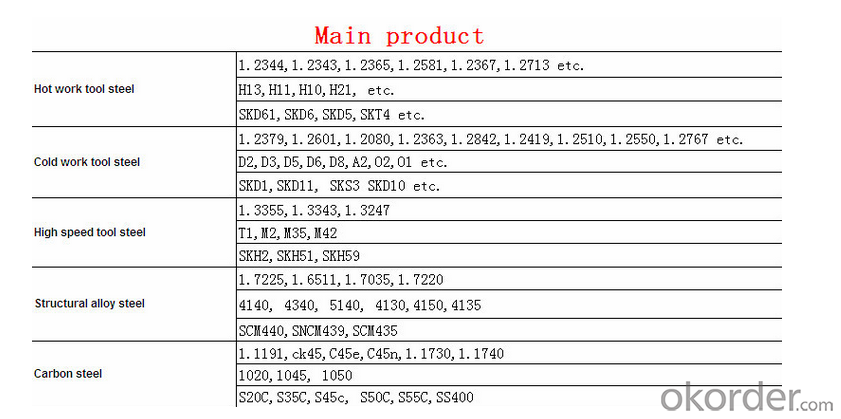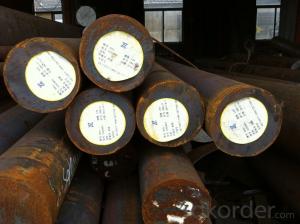Low Carbon Steel SAE1045 S45CCR S55C
- Loading Port:
- China main port
- Payment Terms:
- TT OR LC
- Min Order Qty:
- 30 m.t.
- Supply Capability:
- 10000 m.t./month
OKorder Service Pledge
OKorder Financial Service
You Might Also Like
Item specifice
Low Carbon Steel SAE1045 S45CCR S55C
Product Information:
Heat treatment of c45 carbon steel
1.Quench:1000-1040`C via 600`C and 850`C, preheating oil or wind cooling
2.Temper temperature should be higher than working temperature in order to stabilize the working size of mold
3.Heat up to 650°C of average temperature in order to eliminate the machined stress, 500 °c air cooling after electric cooker cooling
4.Tempering, 800-850 °c ,slow cooling after diathermia
5. Melting Process of SKD61 steel rod
EAF: Electric Furnace+LF+VD(Optional)
Application of c45 carbon steel
(1)Can be used in many fields such as building, automobile, shipbuilding, petrochemical, machinery, medicine,
food, electric power, energy, space, building and decoration, etc.
(2) Can be made into mould template, mortise pin, column
(3)This kind of steel have good mechanical property, is widely used in structural parts which may support
stress alternation, especially made into some connecting rods, bolts, wheel gear...
(4) This kind of steel is the most common blanks and materials of shaft part
 Product Overviews:
Product Overviews:
| Product Name | Typical Grades | Diameter(mm) | Standard adopted |
| Carbon Steel | 20 (1020/S20C/C22) | Ø16-Ø300 | GB/SAE/JIS/DIN |
| 40 (1040/S40C/C40) | |||
| 45 (1045/S45C/C45) | |||
| Bearing Steel | GCr9 (51100/SUJ1) | Ø12-Ø250 | |
| GCr15 (52100/SUJ2/100Gr6) | |||
| GCr9SiMn (A485-Gr.1/SUJ3) | |||
| Cr-Mo Steel | 20Cr (5120/SCr420H/20Cr4) | Ø12-Ø250 | |
| 40Cr (5140/SCr440/41Cr4) | |||
| 42CrMo(4140/SCM440/42CrMo4) | |||
| Gear Steel | 20CrNiMo | Ø16-Ø600 | |
| 20CrMn(5115/SMnC420/20MnCr5) | |||
| 20CrNiMo(8620/SNCM220/20CrMiMo2) |
Product Show:

Our Advantages:
· Industry experience over 20 years.
· Shipment of goods -More than 70 countries worldwide.
· The most convenient transport and prompt delivery.
· Competitive price with best service.
· High technical production line with top quality products.
· High reputation based on best quality products.
With our experienced, enthusiastic and dynamic staffs, we assure to bring you the products with best quality, reasonable prices and good after-sales services under the motto: Friends First, Business After.
Communication, Experience, Expertise and Best efforts are our Promises to you.
- Q:How is special steel tested for quality?
- Special steel is tested for quality through various processes such as chemical analysis, mechanical testing, and non-destructive testing. Chemical analysis involves checking the composition and purity of the steel to ensure it meets the required specifications. Mechanical testing includes assessing the strength, hardness, and toughness of the steel through methods like tensile testing, impact testing, and hardness testing. Non-destructive testing techniques like ultrasonic testing, magnetic particle inspection, and radiographic testing are employed to detect any defects or irregularities within the steel without causing any damage. These comprehensive tests ensure that special steel meets the necessary quality standards before it is used in various industries.
- Q:What are the different surface treatments applied to special steel?
- The different surface treatments applied to special steel include galvanizing, electroplating, powder coating, painting, passivation, nitriding, and heat treatment. These treatments are used to enhance the corrosion resistance, hardness, and aesthetics of the steel, depending on the specific application requirements.
- Q:How does special steel perform in terms of wear resistance in abrasive environments?
- Special steel performs very well in terms of wear resistance in abrasive environments. Its unique composition and treatment processes enhance its hardness and toughness, making it highly resistant to abrasion caused by particles and friction. This allows special steel to withstand harsh conditions and maintain its integrity for prolonged periods, reducing the need for frequent replacements or repairs.
- Q:Can special steel be used in the manufacturing of consumer goods?
- Yes, special steel can be used in the manufacturing of consumer goods. Special steel refers to a specific type of steel that has been engineered to possess unique properties, such as increased strength, corrosion resistance, heat resistance, or wear resistance. These enhanced properties make it suitable for a wide range of applications, including consumer goods. Consumer goods encompass a diverse range of products, such as kitchen appliances, electronics, automobiles, tools, and furniture. Special steel can be utilized in various components and parts of these goods to enhance their performance and durability. For example, in kitchen appliances, special steel can be used to manufacture blades, heating elements, or cooking surfaces, providing improved cutting efficiency, heat distribution, and resistance to corrosion. In electronics, special steel can be used to manufacture casings, connectors, or springs, ensuring durability, conductivity, and resistance to temperature fluctuations. Furthermore, special steel can also be used in manufacturing consumer goods that require high precision and reliability. For instance, in automotive manufacturing, special steel can be used for engine components, chassis, or safety features, providing enhanced strength, impact resistance, and structural integrity. Similarly, in the production of tools and equipment, special steel can be used to manufacture drill bits, cutting tools, or machine components, ensuring longevity, precision, and performance. Overall, special steel offers distinct advantages over conventional steel in terms of its unique properties, making it a suitable material choice for manufacturing consumer goods. Its enhanced strength, corrosion resistance, heat resistance, or wear resistance characteristics can significantly improve the performance, durability, and reliability of consumer products, meeting the demands and expectations of consumers.
- Q:What are the different types of alloy steel?
- There are several different types of alloy steel, including stainless steel, tool steel, maraging steel, high-strength low-alloy steel (HSLA), and nickel-based alloy steel.
- Q:How does special steel contribute to the automotive engine industry?
- Special steel plays a crucial role in the automotive engine industry by offering enhanced performance, durability, and efficiency. It is used to manufacture various engine components such as crankshafts, camshafts, connecting rods, and valves, which are subjected to high stress and temperature. The use of special steel ensures these components can withstand the demanding conditions and provide better power, fuel efficiency, and overall engine performance. Additionally, special steel enables engine manufacturers to reduce weight while maintaining structural integrity, contributing to improved fuel economy and reduced emissions.
- Q:How does special steel perform in construction applications?
- Special steel performs exceptionally well in construction applications due to its superior strength, durability, and resistance to corrosion. It allows for the creation of structurally sound and long-lasting buildings, bridges, and other infrastructure. Additionally, its versatility and ability to be fabricated into various shapes and sizes make it highly suitable for a wide range of construction projects.
- Q:How does special steel contribute to reducing maintenance costs?
- Special steel contributes to reducing maintenance costs by offering enhanced durability, corrosion resistance, and wear resistance properties. This means that components made from special steel have a longer lifespan and require less frequent maintenance or replacement. Additionally, special steel can be designed to withstand extreme conditions, reducing the risk of failures and breakdowns, ultimately leading to lower maintenance costs.
- Q:Can special steel be used in the production of knives and blades?
- Yes, special steel can be used in the production of knives and blades. Special steels, such as high carbon stainless steel or Damascus steel, offer superior durability, sharpness, and corrosion resistance, making them ideal for producing high-quality knives and blades.
- Q:What are the different methods of joining special steel?
- There are various techniques available for joining special steel, each presenting its own advantages and limitations. Some of the most frequently employed methods comprise: 1. Welding: The most prevalent technique for joining steel involves melting the base material and incorporating a filler material to establish a robust connection. Depending on the specific requirements, different welding techniques like arc welding, gas welding, and laser welding can be utilized. 2. Brazing: This approach necessitates heating the steel and melting a filler metal with a lower melting point, which then infiltrates the joint through capillary action. Brazing is commonly employed when joining dissimilar metals or when a lower-temperature joining process is indispensable. 3. Soldering: Similar to brazing, soldering also employs a filler material with a lower melting point to join the steel. However, soldering involves melting the filler material without melting the base material. It is often employed for electrical connections and delicate applications. 4. Mechanical fastening: This method entails utilizing mechanical means such as bolts, screws, rivets, or other types of fasteners to join the steel components. Mechanical fastening is frequently favored in situations where disassembly or maintenance is necessary. 5. Adhesive bonding: Special steel can also be joined using adhesives that establish a sturdy bond between the surfaces. Adhesive bonding is suitable for joining intricate shapes, minimizing stress concentrations, and providing exceptional corrosion resistance. 6. Friction welding: This technique involves the application of pressure to rub or spin two steel components together, generating heat that creates a bond. Friction welding is commonly employed for joining high-strength or heat-treated steels. 7. Explosive welding: This method employs explosives to facilitate a high-speed collision between two steel surfaces, resulting in a bond formed in a solid state. Explosive welding is frequently used for joining dissimilar metals or when high strength and corrosion resistance are required. The selection of the appropriate joining method depends on factors such as the type of steel, the desired strength and durability of the joint, the specific application requirements, and the availability of equipment and expertise.
1. Manufacturer Overview |
|
|---|---|
| Location | |
| Year Established | |
| Annual Output Value | |
| Main Markets | |
| Company Certifications | |
2. Manufacturer Certificates |
|
|---|---|
| a) Certification Name | |
| Range | |
| Reference | |
| Validity Period | |
3. Manufacturer Capability |
|
|---|---|
| a)Trade Capacity | |
| Nearest Port | |
| Export Percentage | |
| No.of Employees in Trade Department | |
| Language Spoken: | |
| b)Factory Information | |
| Factory Size: | |
| No. of Production Lines | |
| Contract Manufacturing | |
| Product Price Range | |
Send your message to us
Low Carbon Steel SAE1045 S45CCR S55C
- Loading Port:
- China main port
- Payment Terms:
- TT OR LC
- Min Order Qty:
- 30 m.t.
- Supply Capability:
- 10000 m.t./month
OKorder Service Pledge
OKorder Financial Service
Similar products
New products
Hot products
Related keywords






























